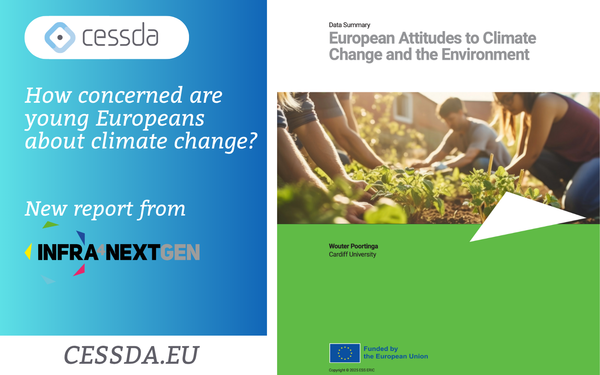
New Report Explores Young Europeans’ Climate Attitudes and Support for Action
The Infra4NextGen project has released the fourth in its series of five thematic data summaries, this time focusing on the Make it Green theme of the NextGenerationEU framework.
The new report, European Attitudes to Climate Change and the Environment, examines how Europeans, particularly those under 35, view climate change, the environment, and policies for a sustainable future. It explores awareness, concern, perceived responsibility, and willingness to act, drawing on extensive data from the European Social Survey (ESS), European Values Study (EVS), and International Social Survey Programme (ISSP).
Authored by Wouter Poortinga (Cardiff University), the summary provides a rich overview of long-term trends and generational differences, revealing how education, gender, and place of living shape young people’s environmental engagement.
Key Findings
High awareness, mixed concern
Awareness of climate change is high across Europe, but levels of concern and perceived responsibility vary. Younger Europeans are more likely than older generations to see climate change as a pressing issue, though overall willingness to pay higher prices or taxes to mitigate its effects has declined over time.
Education matters
Young people with higher education levels consistently show greater concern, stronger engagement, and a higher willingness to make financial sacrifices or participate in climate activism.
Gender differences
Young women tend to express greater worry about climate change, view it as more dangerous, and feel a stronger sense of personal responsibility to act.
Urban–rural divide
Urban residents are more likely to perceive climate change as a serious threat and to feel personally responsible for tackling it, compared with those in rural areas.
Cross-national variation
Concern and activism are highest in Northern and Western European countries, while Southern and Eastern regions show lower levels of engagement.
The report also finds that trust in science remains strong, while belief in “technological fixes” without behavioural change is low, underlining the need for both innovation and individual action.
These insights provide an important evidence base for policymakers, researchers, and civil society actors working to strengthen climate engagement and public support for the green transition.
The Make it Green data summary is part of the Infra4NextGen project’s ongoing analysis of youth perspectives across five key policy areas: Digital, Healthy, Equal, Green, and Strong.
Read the full report: European Attitudes to Climate Change and the Environment (online & PDF)